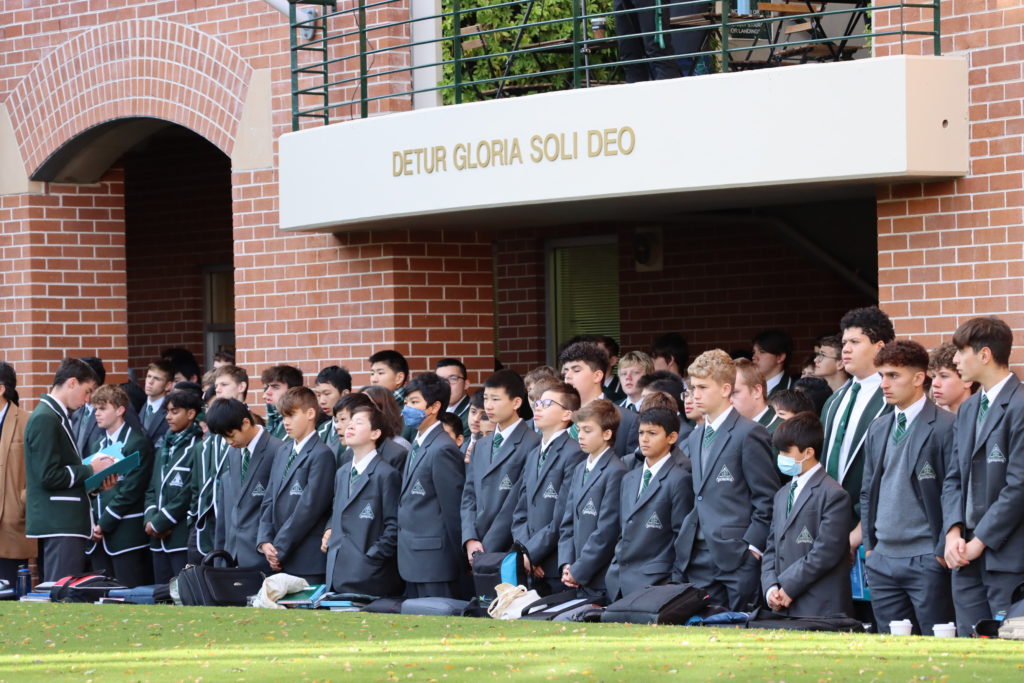What is a Grammar School?
The word may be in the official title of the School, but what does it actually mean to be a ‘Grammar’ school? The answer is not as clear cut as you may think and Australia’s education history differs from the British system it drew inspiration from.
Historically, a Grammar School is one that teaches Latin and, commonly, Classical Greek – this classification stems from mediaeval grammar schools, where their only purpose was to teach Latin but, over time the curriculum broadened. At first, this expansion included Ancient Greek, then English, science, mathematics, history, geography and other subjects that now comprise the education that many of us are familiar with in the 21st century.
Today, at Trinity, there is still a strong tradition of Language teaching, where students are required to choose on Language (Classical or Modern) as an elective during Year 8 and encouraged to continue their study of their chosen language into Years 9 and 10.
In 2022, 46 students from Years 9-12 are studying either Latin or Greek at Trinity Grammar School.
Many private schools in Sydney (and the wider state / nation) were established by churches because there were very few state high schools available – and before 1880, education was not compulsory. Many of these schools fashioned themselves after English public schools, taking on the ‘Grammar School’ title whether or not they had the teaching of Latin or Greek in their curriculum.
However, many of these private schools did offer classical languages and this offering presented another benefit – university-educated teachers. After all, you have to know Latin to be able to teach it. The credentials of Trinity’s founder and early staff show us that this theory holds some weight – while their primary and secondary education varied greatly, 4 of 6 of them had attended university. In a time where anyone could start a school, regardless of their education background, it was a comfort to many to be able to send their children to a school that offered teachers with a higher level of education.
We can see some of the vision of Grammar Schools in the Sydney Grammar School Act 1854. Sydney Grammar School was deliberately non-denominational, so differed from many of the Grammar Schools of the time. In the Act, it was outlined:
WHEREAS it is deemed expedient for the better advancement of religion and morality and the promotion of useful knowledge to establish in Sydney a public school for conferring on all classes and denominations of Her Majesty’s subjects resident in the Colony of New South Wales without any distinction whatsoever the advantages of a regular and liberal course of education.
It is also likely that ‘Grammar Schools’ would have been seen as a good option to prepare, at least some, students for university. While tertiary education is a common continuation of education for many Trinity boys today, it has not always been so easily accessible. Of course, there were other routes to a university education, including night classes for adults / men with day jobs or trades through the School of the Arts or private tutors.
An edition of The Triangle from June, 1918, speaks of both the education that Trinity sought to provide in these early years – one of mind, body, and spirit – and the hopes that the educators of the time had for the futures of the students:
“Considering that the High School course is five years and that Trinity has only completed its fifth birthday, we can hardly hope for a year or two to send numerous candidates for the Leaving Certificate, but the time has decidedly come for numbers of our fellows to attack the Intermediate successfully. In December last, the first Trinity team of any size went up and of eighteen candidates [IC] the very satisfactory score of fourteen passes was secured. This we hope is just the modest beginning of many achievements.”
It’s clear that today, Trinity reflects the traditional ideal of a ‘Grammar School’ through its teaching of Latin and Classical Greek, while also embracing the Australian approach to Grammar Schooling to prepare students for further education and success.
Want to know more about working at Trinity? Check out all the employment opportunities available.

















